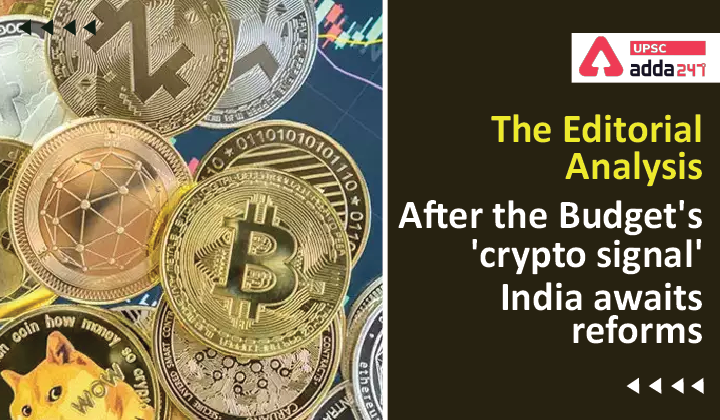Table of Contents
Cryptocurrency in India: Relevance
- GS 3: Indian Economy and issues relating to planning, mobilization, of resources, growth, development and employment.
Crytocurrency in India: Context
- Budget 2022 announced a 30% flat tax rate levied on any gains made from the transfer of virtual assets including cryptocurrencies and Non-Fungible Tokens (NFTs).
- This announcement now leads to the assumption that crypto is legal in India.
What is cryptocurrency?
- Cryptocurrency (crypto) consists of a digital denomination designed to work as a medium of exchange through a distributed computer network (a blockchain) that is not reliant on any central authority such as a government or a bank for its upholding and maintenance.
30% tax on crypto: Significance of the decision
- The decision affirmed the fact that cryptocurrency and related technologies could play in India’s financial-cum-economic system.
- 30% tax is a premium and price well-worth paying in exchange for what is effectively a ruling-out of prospects for a total ban on crypto.
- This decision could open up more doors for technologically savvy and innovation-minded investors.
- Such transformations would involve DeFi (Decentralised Finance) activities such as staking, lending, and providing liquidity, among others.
- The adoption of crypto currencies and virtual assets would enable quicker and cheaper transactions compared to banks and new forms of wealth creation without centralised intermediaries
About Decentralized finance (DeFi)
- DeFi (or “decentralized finance”) is “an umbrella term for financial services on public blockchains.
- DeFi allows most of the things that banks support — earn interest, borrow, lend, buy insurance, trade derivatives, trade assets, and more — but it is faster and does not require paperwork or a third party.
- As with crypto generally, DeFi is global, peer-to-peer (meaning directly between two people, and not routed through a centralised system), pseudonymous, and open to all.
30% tax on cryptocurrency: Concerns
- Small and Medium-sized Enterprises (SMEs): The community of SMEs and lower-end high net-worth individuals is going to find it most difficult to access the ecosystem given the substantial barriers posed by the tax rates.
- Lack of clarity: CBDC, or Central Bank Digital Currency defeats the fundamental purpose of cryptocurrency, which is decentralisation.
- Though a Cryptocurrency Bill is yet to be passed, there appears to be a push to treat crypto as purely an asset class than a currency.
Cryptocurrency in India: Reforms needed
- Reduce tax rates in future: However, it must be weighed against considerations concerning government revenue and the need to curb speculative bubbles surfacing in relation to the currency.
- Introduce more rigorous regulations, without which crypto has the potential to become a source of illegitimate political funding or black money.
- Insights from international communities: International communities should be involved for their insights and advice on the best practices associated with cryptocurrency policy making.
Also Read:





 TSPSC Group 1 Question Paper 2024, Downl...
TSPSC Group 1 Question Paper 2024, Downl...
 TSPSC Group 1 Answer key 2024 Out, Downl...
TSPSC Group 1 Answer key 2024 Out, Downl...
 UPSC Prelims 2024 Question Paper, Downlo...
UPSC Prelims 2024 Question Paper, Downlo...





